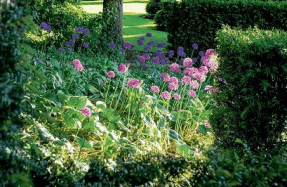


“In the past, I’ve always gardened on sand. The clay loam here means I can try all sorts of things I couldn’t grow before”
If ever anyone was born to be a gardener, it’s Claire Austin. Her father, David, was the pioneering rose breeder whose English roses, including varieties like ‘Gertrude Jekyll’, ‘The Generous Gardener’ and ‘Graham Thomas’, are now sold all over the world. “It sounds strange, but when I was growing up I didn’t consider my father a gardener,” Claire recalls. “My mother, Pat, was the real gardener. My father was a farmer during my childhood, and later, when he started breeding roses, he grew them as a crop.”
Claire had no intention of following him into horticulture; her ambition was to be an artist. “I wanted to be an illustrator. Unfortunately, I finished art college






